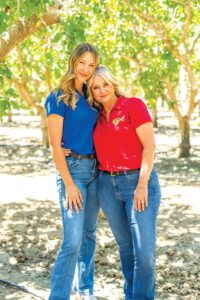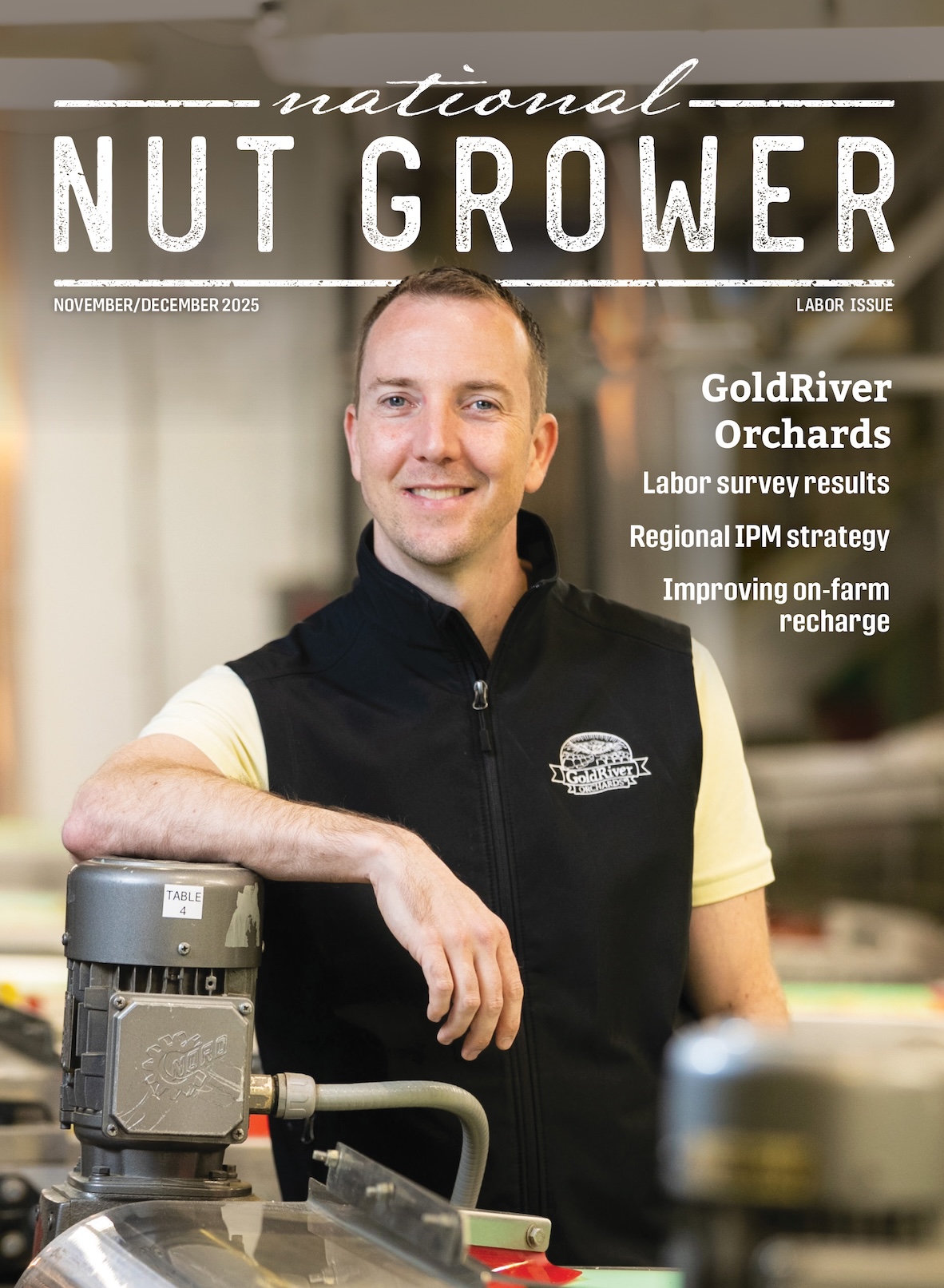
March/April 2025
Women in ag: Cultivating the future of farming
Women are making a significant impact in agriculture, taking on leadership roles in farming, advocacy and agribusiness. As they manage orchards, drive sustainability initiatives and spearhead advancements in the field, women are challenging norms and shaping the industry’s future.
From family-owned orchards to large-scale commercial enterprises, their contributions highlight both the opportunities and challenges in this evolving sector. The following are some of the women leading the way across the tree nut industry.
Tobbie Wells

Tobbie Wells knows that great leadership requires open lines of communication.
“I talk to my team on a very, very regular basis. I believe you find the most success by giving people the support they need and an open-door policy to communicate,” Wells said.
It’s an approach that Wells has employed for nearly two decades at Orchard Machinery Corporation (OMC), a Yuba City, California-based orchard harvesting equipment manufacturer that specializes in solutions for tree nuts and fruits. Wells’ father, Don Mayo, purchased OMC in 2004, and she initially served as the company’s CFO and on its board.
Wells, a certified public accountant who holds an undergraduate degree in accounting and an MBA with a specialization in taxation, was her father’s right-hand employee, especially when it came to strategic planning and budgeting.
“I talked to my father at least a couple times a day via FaceTime, and 95% of the time it was about the business,” she said. “We both had a love for the business.”
Unfortunately, Wells’ father suddenly passed away in 2022.
“Thankfully, we had a very strong succession plan in place, as that was something my father and I spoke about on a regular basis. We knew we needed to have a plan in place in case something happened,” Wells said. “My father died on a Friday afternoon, and I showed up at the plant at six o’clock the next morning. It was an emotional challenge, but I wanted to give everyone my condolences and reassurance, and be extremely active and communicative from literally day one.”
Wells has been OMC’s president and CEO since that day, and it’s an opportunity she embraces with enthusiasm.
“I constantly want to figure out ways to push the industry forward and help growers be more efficient with their harvest. It’s exciting for our team because we all know that it’s never going to be just the status quo. We will always be pushing forward, and it’s so much fun,” she said.
Wells is also passionate about communicating with OMC’s customers and supporting the growth of the ag industry.
“We want to hear from our customers. How did harvest go? What are your challenges? What can we do to help you? Having open conversations with our customers, the growers, is a huge part of making business better for everyone,” she said.
As agriculture continues to evolve, Wells encourages other women in the industry to be comfortable with who they are and confident in their skills.
“Walk in the front door, not the back door. Walk in like you own the place,” she said. “You will gain respect.”
Jenny Holtermann

When fourth-generation almond farmer Jenny Holtermann started her Instagram account — @AlmondGirlJenny — nearly 12 years ago, she knew it had the potential to be a powerful platform for her work.
“I want people to see the face of a farmer, and I want them to see what we do every single day and the hard work and the family that is associated with that,” Holtermann said. “What we’re doing isn’t just a job; it’s our livelihood.”
Holtermann’s engaging photos and videos have helped her amass thousands of followers, who get an up-close and personal look at how she balances the work on her family’s farm with her extensive ag advocacy efforts.
“These days, social media has to be part of what we do as farmers. Most people today don’t turn on their TV to get their news — they’re turning to social media,” Holtermann said. “And do you want people to be learning about what’s happening in agriculture from some random person, or do you want them to learn it from the actual boots on the ground who are doing the job day in and day out?”
Holtermann’s days are jam-packed. While her husband manages the everyday operations of their Wasco, California, farm, she has her hand in everything from running farm tours and seasonal events like Brunch in the Bloom to tending to their chickens, garden and fruit orchard. She’s also the mom of two active kids and oversees the farm’s online shop, which is stocked with almonds, honey, shirts, hats, stickers and gift baskets.
All of that’s in addition to her role as executive director of the Water Association of Kern County, a nonprofit that supports education, outreach and information about the county’s water issues.
“Water is obviously a super important factor in farming. Here in California, water is also very politicized and has lots of governing regulations over it,” Holtermann said. “It’s a big part of our daily life.”
Additionally, Holtermann serves as the president of the Kern County Farm Bureau and is a board member of the California Farm Bureau. These positions, along with her water advocacy work, require her to spend countless hours in meetings; collaborate with farmers, landowners, business owners, legislators and other industry key players; and travel at the local, state and national levels.
Holtermann said her advocacy work fuels and inspires her, and she encourages others in the ag industry to get involved in whatever capacity they can.
“If you find the politics part of agriculture interesting, that’s great — we need more people sharing that message on a state and national level. Or, get on a social media platform and share what you’re doing,” she said. “But even the simple things, like buying from and promoting your local farmers, matter. Advocacy can start right there at the grocery store when you’re making the decision to buy local.”
Teresa and Elizabeth Keenan

Teresa and Elizabeth Keenan, the mother-daughter duo driving the marketing team at Keenan Farms, want every woman to know that there’s a seat at the table for her, especially as the ag industry evolves.
“When I was growing up, everyone’s parents or grandparents were farmers. Today you rarely see an 80-acre farm make a living for an entire family,” Teresa said. “Now you see larger farms, and you also see daughters, wives and women from non-ag backgrounds stepping up and taking a seat at the table. It’s fantastic to see — there’s so many more women in leadership positions making hard decisions on behalf of their companies.”
As the third generation to lead Keenan Farms, located in Kettleman City, California, Elizabeth shares her mom’s enthusiasm for the future. “I’m excited that everyone is recognizing that we all have a place in the industry. I think we’re heading in such a great direction.”
Much of this momentum was fueled by women like Teresa, who grew up on a dairy farm and knew from a young age that she wanted to pursue a career in agriculture.
“I went to Fresno State as an ag business major with a dairy industry option. I was accepted as an intern with the California Milk Advisory Board, I was on the Fresno State Rodeo Team and I worked in the laboratory at Danish Creamery,” Teresa said. “I had a lot of fun and learned a lot, and it set me up for the rest of my career.”
After graduating from college, Teresa hit the ground running as a media spokesperson for the California Pistachio Commission. She toured the country promoting the growing pistachio industry and the health benefits of the tree nuts. During this time Teresa met and married Bob Keenan, whose family was among the first pistachio farmers and processors in the U.S.
As Keenan Farms grew, so did Teresa and Bob’s family. They encouraged Elizabeth and her brother Mitchel to be involved in the family business and gave them a hands-on education to the many aspects of running a successful pistachio farm.
While Elizabeth eventually followed in her mom’s marketing footsteps at Keenan Farms, Teresa has encouraged Elizabeth to make her own mark in the ag industry.
“She’s let me spread my wings and pursue my own passions in the industry,” Elizabeth said. “I’m really interested and involved in the community and advocacy side of things. I want to keep developing my relationship with the grower community and fellow processors, and continue to advocate in new and interesting ways. Giving back to the community is also a huge goal of mine.”
Whether it’s through marketing, advocacy or another facet of the ag industry, Teresa encourages other women to find their own niche.
“Find other women you can learn from,” she said. “Don’t be afraid to ask for what you want or need, and come join the party.”









